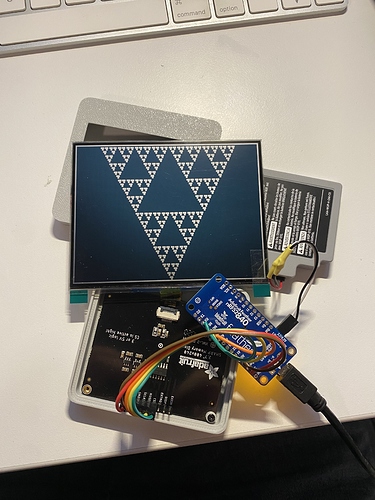Hello,
Thanks for uLisp! It’s a lot of fun to play with. I was able to get it running on an “Adafruit Feather nRF52840 Express” board - thanks to the excellent uLisp porting documentation, and the fact that it is basically the same as the other Adafruit nRF52840 boards which were already supported.
I was also able to make basic graphics work using both the included 2.7" 400x240px, and a 4.4" 320x240px SHARP Memory Displays (LS044Q7DH01) with the Adafruit breakout board: https://www.adafruit.com/product/4694
Here’s a picture of it displaying the Sierpinski example:
I find these displays really cool. They use nearly no power even when constantly updating - the datasheet claims 1200uW with 1 screen update/s. Battery life for this board and display combination should be quite good already, but my hope is to get uLisp working with sparkfun’s artemis module which advertises “less than 5mW at full operation”. That should make for really good battery life even when running at 100%.
Here’s a dump of my code if anyone is interested. I haven’t really tested anything other than the graphics yet. The board has a pin defined as AREF so I renamed AREF to AREFF in the uLisp code - definitely hacky but it works ;-) https://gist.github.com/andreer/e6bf7798df38cc79ac9473b431e157d6

